Backyard poultry farmers faced several issues and challenges during COVID-19 pandemic. Dr Vidyasagar, Dr Prakashkumar Rathod, Dr D Dilipkumar and Dr Prashant Waghmare discuss efforts made by Veterinary College, KVAFSU, Bidar, Karnataka, to address the challenges and support farmers.
CONTEXT
The first case of COVID-19 pandemic in Karnataka was confirmed on 9thMarch 2020. Two days later, Karnataka state became the first in India to invoke provisions of the Epidemic Diseases Act, 1897. The State was under lockdown, and barring essential services no commercial activity in majority of the districts was allowed. However, the first case of COVID-19 in Bidar district was reported in first week of April and has crossed 1400 cases very recently. This pandemic has created huge loss to livestock and poultry farmers across the state and Bidar district. Within the livestock sector, poultry sector was badly affected due to an outbreak of bird flu in January in some regions of Karnataka followed by COVID-19 pandemic from March.
During the initial phase of COVID-19, poultry farmers and sellers received reduce prices in the market compared to high production cost, ultimately leading to heavy losses to the poultry sector. The poultry breeders association estimated a loss of 22,500 crore rupees during mid-February to April (https://www.outlookindia.com/newsscroll/covid19-outbreak-poultry-sector-faces-rs-225k-crore-loss/1790419.) Further, unorganized poultry sector, also referred to as backyard poultry, which plays a key role in supplementary income generation and family nutrition to the poorest of the poor (Rathod, 2020), has also suffered heavy losses during this pandemic.
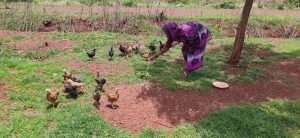 Backyard poultry rearing © VCB
Backyard poultry rearing © VCB
SPECIFIC CHALLENGES IN BIDAR DISTRICT, KARNATAKA
Veterinary College, Bidar (under the aegis of Karnataka Veterinary, Animal and Fisheries Sciences University, Bidar, Karnataka) and the poultry farmers in Bidar have faced several issues and challenges during lockdowns. Some of them are discussed below.
Lack of Extension and Advisory Services (EAS)
Restrictions on movement of people during the lockdown resulted in a situation where farmers were not in a position to visit farm advisory and solution centres such as KVKs, veterinary college, etc. Also, COVID-19 and subsequent lockdown prevented direct contact with farmers; trainings/direct interactions were affected. Although Veterinary College, Bidar, has been organizing training programmes and giving hands-on trainings for the benefit of farmers, all the activities were stopped due to lockdown. The trainings and demonstrations focused on management aspects like brooding, nutrition, common diseases and their prevention, vaccination, etc. The farmers from Bidar district, its neighbouring districts and neighbouring states were also affected as Bidar is located close to Maharashtra and Telangana boarders.
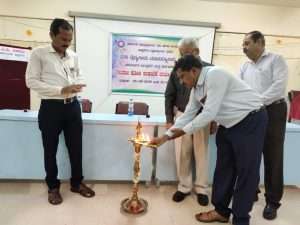 Inauguration of backyard poultry training programme © VCB
Inauguration of backyard poultry training programme © VCB
Poor demand for poultry chicks and eggs
Veterinary College, Bidar, has Giriraja breeder farm and hatchery unit with two breeder sheds of 500 capacities, incubator of 10,000 eggs capacities and hatcher of 10,000 eggs capacity. There was an increasing demand from farmers for poultry chicks and eggs over the last two years. However, during the lockdown period, farmers who had visited Veterinary College, Bidar, with a plan to procure Giriraj chicks and eggs did not turn up due to restrictions on movement. However, as the lockdown situation is getting relaxed, farmers have been demanding for chicks and eggs. It is clear that they were worried about the lockdown situation and did not plan to take risk by rearing those birds during lockdown period.
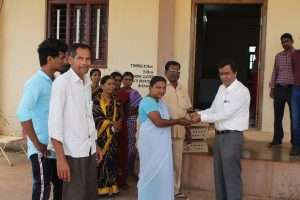 Distribution of chicks by Dean, Veterinary College, Bidar © VCB
Distribution of chicks by Dean, Veterinary College, Bidar © VCB
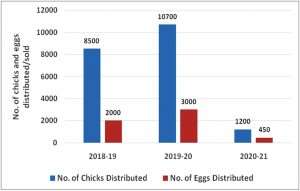 Distribution of chicks and eggs during last two financial years
Distribution of chicks and eggs during last two financial years
Lack of Market and Marketing
As an institution, Veterinary College, Bidar, also faced the problem that consumers and stakeholders faced in selling or distributing chicks and eggs. Almost similar problems were also faced by small and marginal farmers who faced the problems in securing their livelihood since they usually sell their poultry birds as well as eggs directly in the local markets or to hotels. Further, lockdown scenario under COVID-19 resulted in disruption of marketing channels on both consumers’ and suppliers’ side as majority of the shops were closed. As a result, the overall demand in wholesale markets fell drastically as supply of these perishables to distant places was stopped. Several myths created against chicken meat and eggs during COVID-19 were a big blow for the poultry industry in India.
Issues in procuring veterinary and input services
COVID-19 lockdown restricted the availability of veterinary and input services like medicines, poultry feed, etc. used specifically for poultry birds. Since feed accounts for major cost of rearing birds, sudden lockdown closed down many feed industries/suppliers, ultimately causing decrease in production and rearing birds on maintenance basis only. Lockdown also created financial hurdles to purchasing inputs like concentrate feeds as farmers did not have cash or the inputs were not available in the local market. Due to lack of markets during this crisis, farmers had to rear existing birds for extra period with more investment. Most of these issues related to timely input purchase and increased investment were also noted in Veterinary College, Bidar.
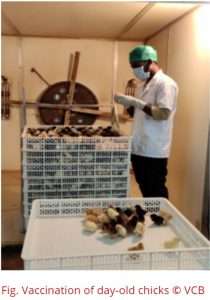 Culling or disposal of birds
Culling or disposal of birds
Veterinary College, Bidar, has observed very good demand over period of time and the same was also expected this year. However, sudden lockdown and rumours regarding poultry industry affected many institutions and farmers. The hatched chicks which were ready for sale could not be sold and were retained in the hatchery unit itself. Further, feeding of these retained chicks was also a tough task due to non-availability of feed. Further, due to non-availability of feed to parent stock, many adult birds were culled at very low prices. Also, about 3000 fertile eggs were disposed due to decrease in demand during lockdown period.
EFFORTS OF VETERINARY COLLEGE, BIDAR, TO ADDRESS THE ISSUES AND CHALLENGES
During COVID-19 pandemic in India, one of the greatest challenges was to sensitize and educate masses about myths regarding poultry industry apart from addressing the issues and challenges faced by farmers during such crisis. In this direction, few of the efforts undertaken by Veterinary College, Bidar, to address the issues and challenges are discussed below.
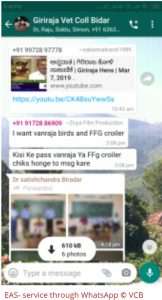 Mobile based EAS delivery
Mobile based EAS delivery
As most farmers were unable to visit the college, farmers called experts on phone and messaged them on WhatsApp. The problems were understood with the help of photographs and video clips, and online solutions were provided as per requirement. The WhatsApp group, which was created during October 2018, became very active during lockdown period. Several issues faced by farmers were discussed and demand related advice was also given to the farmers. The farmers were guided scientifically for feeding, vaccination, marketing, etc.
Addressing the emergencies
As most farmers faced difficulties in accessing different input and health care services, experts suggested the farmers to utilize local resources to address those issues. Some of the issues addressed were home remedies for treatment, preparation of alternative cost-effective feed resources, marketing, summer management of birds, etc. The farmers were also advised through mass media about precautionary measures to be followed during poultry rearing, marketing, meat cooking and consumption.
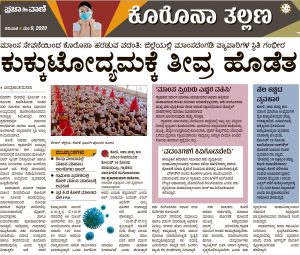 Advisory through mass media in Kannada language for farmers and consumers © VCB
Advisory through mass media in Kannada language for farmers and consumers © VCB
Field / farm visit
As this hatchery unit has a revolving fund and is not supported through ongoing projects, it was difficult for the experts to visit the farm or farmers in villages. This is also a common problem for majority of the government institutions bound by several rules and regulations for budget expenditure. However, upon request by the nearby farmers, field visits were conducted with all precautionary measures by the concerned personnel to address issues in field conditions.
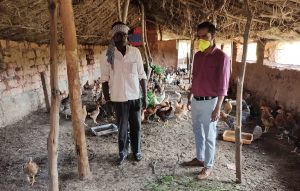 Field visit by experts of Veterinary College, Bidar © VCB
Field visit by experts of Veterinary College, Bidar © VCB
Linking to markets
During lockdown period, all the meat shops were closed in the district. In this context, Department of Animal Husbandry and Veterinary Services, Bidar, and Karnataka Sheep and Wool Development Board initiated a mobile van facility “meat on wheel” for meat consumers which delivered meat while following distancing measures. Although Veterinary College, Bidar, could not be a partner in this initiative directly, it advised farmers to sell their birds to these units. Through this model, many farmers could sell their birds while consumers could get good quality meat.
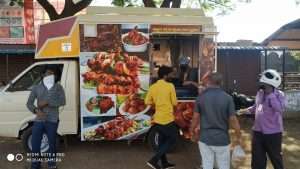 Mobile van facility “meat on wheel” for meat consumers
Mobile van facility “meat on wheel” for meat consumers
END NOTE
In the existing pandemic scenario, the authors realized a great demand for backyard poultry farming and its related information despite the lockdown situation. Major issues of farmers included lack of veterinary and input services, and identifying the right market that can give them fair remuneration. Institutions like Veterinary College, Bidar, could assist the farmers to a limited extent due to certain restrictions and lacunae. A policy shift emphasising delivery of inputs and regular follow-up for such interested farmers is critical to enhance production and productivity. The announcement by Government of India for infrastructure development in livestock sector may support creating linkages with market, creating mobile input service facilities (using a mobile van, for instance) and feed preparation units to meet such crises in future. Further, public private partnerships and formation of farmer interest groups or farmer producer organizations needs to be promoted to a greater extent in the days to come.
Acknowledgments
The authors gratefully acknowledge funding support by Rashtriya Krishi Vikas Yojana, Government of India, and sincerely thank all officers of KVAFSU, Bidar, for their support and motivation.
References
GoK (Government of Karnataka). 2020. Office Order of Government of Karnataka. No RD158 TNR 2020. Available at: https://covid19.karnataka.gov.in/storage/pdf-files/RD%20158%20TNR%202020%20dated%2018%2005%202020.pdf.pdf
Rathod, P.2020. A Guide to Backyard Poultry Farming for Sustainable Livelihoods. Booklet. International Crops Research Institute for the Semi-Arid Tropics, Patancheru, Telangana, pp. 28. Available at: http://idc.icrisat.org/idc/wp-content/uploads/2020/02/Final-Backyard-Poultry-Farming_A5_Full-2.pdf
 Dr. Vidyasagar, is Assistant Professor in the Department of Livestock Production and Management, Veterinary College, KVAFSU, Bidar (India) (vsgr00@gmail.com).
Dr. Vidyasagar, is Assistant Professor in the Department of Livestock Production and Management, Veterinary College, KVAFSU, Bidar (India) (vsgr00@gmail.com).
 Dr. Prakashkumar Rathod is Assistant Professor in the Department of Veterinary & A.H Extension Education, Veterinary College, KVAFSU, Bidar (India) (prakashkumarkr@gmail.com).
Dr. Prakashkumar Rathod is Assistant Professor in the Department of Veterinary & A.H Extension Education, Veterinary College, KVAFSU, Bidar (India) (prakashkumarkr@gmail.com).
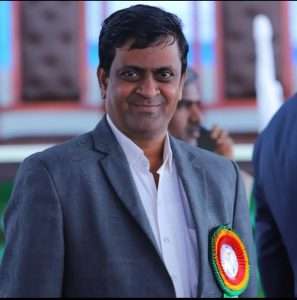 Dr D Dilipkumar is Dean, Veterinary College, KVAFSU, Bidar (India) (deanvcb@gmail.com)
Dr D Dilipkumar is Dean, Veterinary College, KVAFSU, Bidar (India) (deanvcb@gmail.com)
 Dr. Prashant Waghmare is Associate Professor and Head in the Department of Livestock Production and Management, Veterinary College, KVAFSU, Bidar (India) (prashantwaghmare95@yahoo.in).
Dr. Prashant Waghmare is Associate Professor and Head in the Department of Livestock Production and Management, Veterinary College, KVAFSU, Bidar (India) (prashantwaghmare95@yahoo.in).









71 Comments